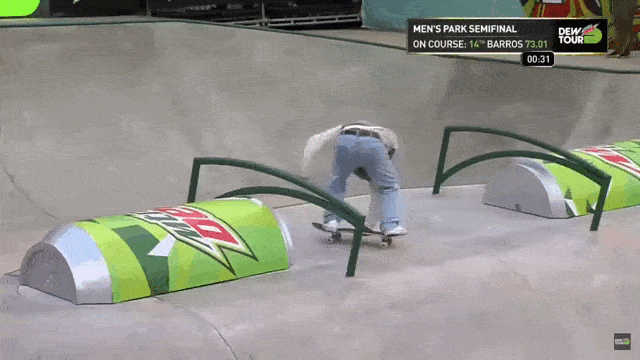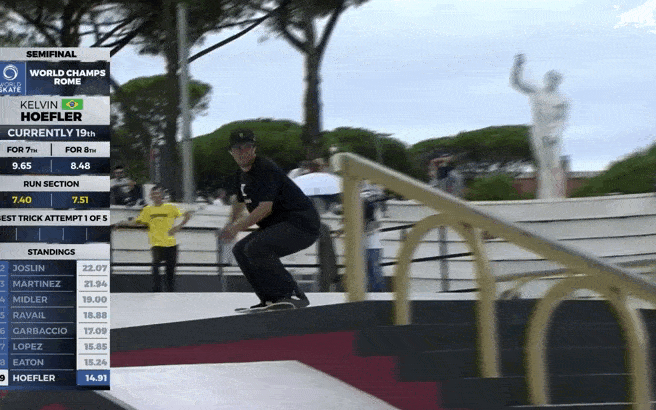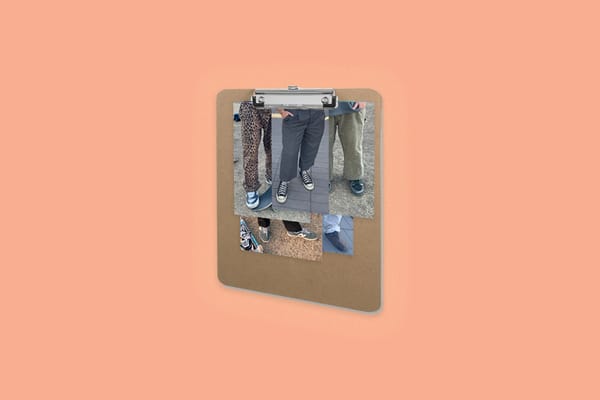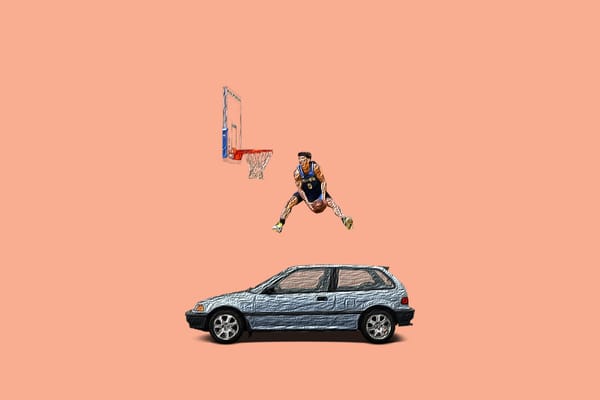Maybe He's Got a Wet Board
Olympic skateboarding qualifiers and playing the game.
The day before Zion Wright decided to empty the tank on a dizzying final run to win last month’s Dew Tour park contest, earning himself a spot on the U.S. Olympic team, a protest confused the crowd in Des Moines, Iowa. During one of skateboarding’s only Olympic qualifying events this year, Brazil’s top “park” skaters, including an expected favourite to take gold in Pedro Barros, chose to phone it in.
An already strange weekend marred by multiple rain delays then saw Barros, who’s usually found looping through the sky like an eagle chasing prey, instead decide to stinkbug-hop a small circle around the Mountain Dew can bedazzled obstacle in the centre of the bowl referred to as the “loaf.”

This was apparently in response to what Barros and his compatriots thought to be unfair judging. Tom Scharr had completed a run they felt deserved to launch him into the top eight skaters who would compete in the finals the next day. It didn’t. So Barros, Pedro Quintas and Luiz Francisco, who’d already pre-qualified for Brazil’s Olympic team, tanked their runs in an act of solidarity. This would make sure they didn’t take a spot in the finals that Tom might, giving him a chance to qualify for team U.S.A.
The broadcast team was at a loss as Quintas calmly carved around the bowl, not venturing anywhere near its lip.
“Maybe he’s got a wet board?”
These skateboarders, on the doorstep of the most prestigious competition in sports, were still willing to have a little fun in pseudo-Neil Blender fashion, doing what they believed was taking a stand against Olympic skateboarding’s shadowy governing body, World Skate. If some were worried about skateboarding losing its sense of self by becoming an Olympic sport, perhaps this was a sign of life. A fluttering of the eyes. Or maybe it was just another way to play the game.
At the final Olympic qualifying event in Rome in early June, the “street” skaters played the game in a different, less disruptive way to the powers-that-be. They’d been tracking how the system worked for years by this point, experimenting to see what tricks would inch the mercurial decimal points of their scores incrementally higher. Now they even had coaches to help them sift through the nuances they believed the judges favoured. Like a cornerman in a prizefight, whispering an opponent’s weakness they’d scouted into their charge’s ear.
You could watch strategies unfold in real-time. Matt Berger would Kickflip Backside Lipslide the big rail during the run section, a common maneuver in the field, but once the contest’s best trick section began, he’d Kickflip Backside Tailslide it. If successful with that, he’d one-up himself again by Bigspinning out. Berger’s approach that of a dial being turned up a notch at a time until his performance would rise above the noise of the rest. He’d place 6th overall.
Others paid more attention to those around them, noting which of their opponent’s tricks scored high and then executing it themselves — because judges couldn’t give you a lower score than what’s already been given, right? That savviness lead to Alex Midler, Kelvin Hoefler, Jake Ilardi, and Sora Shirai, all Caballerial Backside Tailsliding their ways into the finals.

The trick scored them all an impressive 8.20, so if you could do it, why would you pass that up? And while the “street” skaters wanted to win, the opposite of Pedros and his countrymen, they all had, in a sense, used their collective abilities to work the game from the inside. Because that’s what finding an advantage in sports looks like — pushing the nub of crayon right up to the line.
Talking about skateboarding as a sport with rules that can be followed or bent goes counter to what most think of it. It shouldn’t, though; there’s always been competition and arbitrary rules that dictate the culture. From the career driving rush to get NBDs, scoring 9 Clubs, Elijah Berle skate-stopping a rail so no one else could take his trick, to that year everyone wore camo pants.
The stage is just bigger and brighter now. The rewards for success, gold medals and cereal boxes. Even from that vantage, skateboarding still looks the same for some.
Alexis Sablone’s Olympic training facility also serves as the entrance to the Museum of Natural History in Manhattan, where she would be skating anyways, Olympics or not. The waxed benches getting their usual reps in regardless. It just so happens that an HBO camera crew is there this time, watching in bemused fascination as she prepares to play the biggest game of them all.





